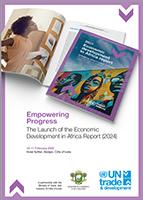
The United Nations General Assembly mandated Economic Development in Africa Report (EDAR) serves as a vital tool for guiding economic discourse, facilitating cooperation, and fostering a shared vision for sustainable development across Africa. By disseminating knowledge and best practices, the report contributes to capacity building within African governments and institutions, enabling them to implement effective economic policies and strategies. The international press launch of the EDAR serves to amplify its impact, ensuring that its policy recommendations resonate widely and contribute to meaningful economic discourse and action focused on Africa’s development.
For the 2024 edition of EDAR, which focuses on enhancing Africa’s trade potential through regional market integration and reducing risks associated with external shocks, UN Trade and Development decided to launch it on the African continent, as it did for EDAR 2023. Launching a report like the Economic Development in Africa Report (EDAR) in an African country—rather than from Geneva—brings several strategic and practical value additions, both symbolic and substantive.
First of all, it brings the report closer to its core stakeholders—African policymakers, businesses, civil society, and the public—which helps ensure that the findings and recommendations of EDARs are more directly understood, debated, and implemented at both national and regional levels. Through the launch of flagships such as EDAR in an African Member State, UN Trade and Development is better able to facilitate or contribute further to the convening of platforms for high-level dialogue among governments, development partners, private sector actors, and international organizations on emerging issues affecting the continent. Furthermore, launching EDAR in Africa does not only facilitate public-private partnerships, but it also catalyses policy discussions at the national and regional levels around the report’s findings and recommendations, which often trigger reforms or help accelerate ongoing sustainable development initiatives.
Secondly, an UNCTAD flagship launched outside of Geneva increases media coverage and awareness internationally, enhancing visibility of the institution’s mandate and support to Member States and elevating the host country’s international profile by showcasing its economic progress, reforms, and leadership in regional development. For instance, the report launch event and the high-level policy dialogues that are organized around the theme of the report can act as a soft diplomacy and economic marketing tool — highlighting progress achieved and opportunities to tap into in trade, investment, and sustainable development.
Launching the EDAR in an African country transforms a policy document into a living, actionable instrument — one that empowers stakeholders, enhances ownership, and anchors global economic discussions in African realities. It’s both a symbol of inclusivity and a mechanism for deeper impact.
